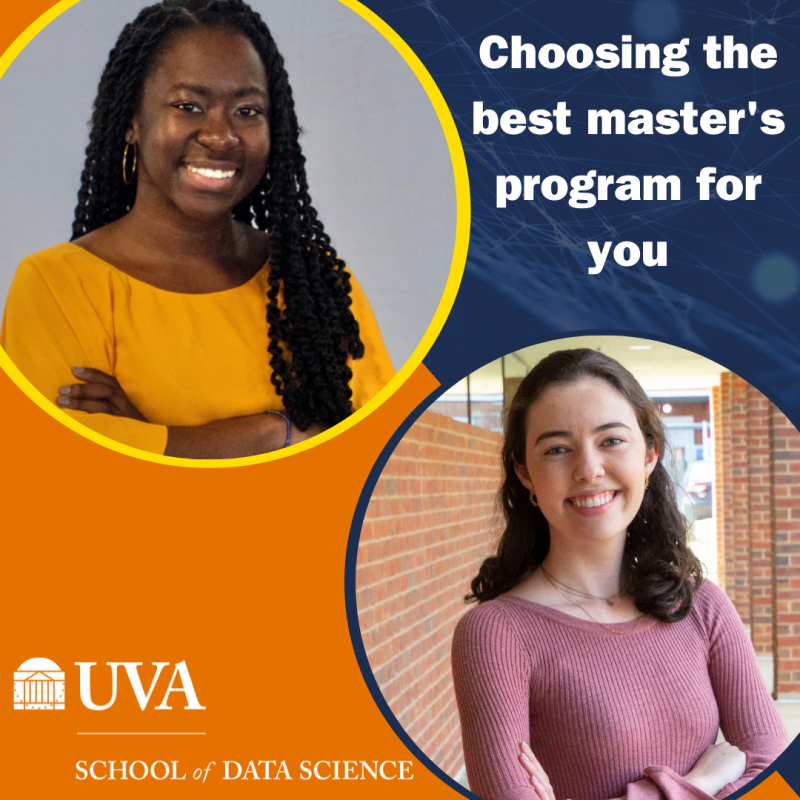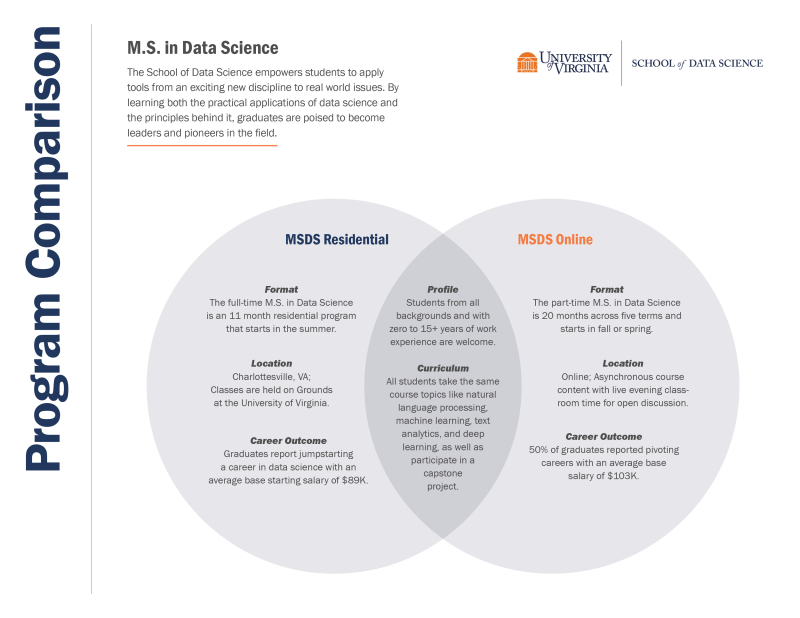Choosing the Best Master's in Data Science Program For You

Students who are considering a master’s in data science at the School of Data Science often feel unsure about which program — online or residential — will best fit their needs. While similar in educational content, the two format options differ in length, structure, and time commitment.

To better understand the two degree formats, we sat down with two graduate students at the School. Brago Aboagye-Nyame an online M.S. in Data Science (MSDS) student, was drawn to the master’s as a natural extension of her undergraduate studies in math and statistics. Residential MSDS student Madeline Hennessey studied cognitive science with a concentration in computer science and said she was drawn to data science after learning that it was a rapidly growing field.
We spoke with them both about their experiences in their respective programs.
Why did you choose your program?
BA: I chose the online program mainly because it was a part-time program and I wanted to be able to keep working while I was in school. I also liked the fact that I didn’t have to relocate to Charlottesville.
MH: I did consider the online program, but I do really like the experience of being in person on Grounds. I am a person who likes face-to-face interaction and who likes to learn from professors in a classroom setting.
How did the time commitment factor into your decision?
BA: Knowing that I can fit schoolwork into the schedule I already have, rather than school being the main driver of my schedule [influenced my decision]. What helps the most about it being part-time is that we’re taking two classes per semester instead of it being a full-time schedule with five or six classes at a time. Two classes is pretty easy to manage along with work, life, and other obligations.
MH: I’m used to being a full-time student because I did just come out of my undergraduate degree. And I’m used to holding a part-time job in addition to school. Being on Grounds, being able to interact with people in person, and the fact that the residential program is 11 months, that was also definitely a benefit.
How does the MSDS prepare you for a career in data science?
BA: The biggest thing is working with data and being comfortable looking at data without feeling overwhelmed, like, “oh that’s a huge data set or database.” I think one thing the program has prepared us for is being able to see an excel file and know what kind of information to pull out of it. But we also learned how to talk about data and share our findings with a variety of audiences: your managers, your clients, and the general public.
MH: One of my favorite things about the M.S. in Data Science classes is that almost every single class you do a project — and it’s usually a group project — you pull on real-world data. So, it’s almost like you’re working at a company trying to solve real-world problems, which is extremely beneficial, and I know it will help me a ton in whatever career I choose.
What is the cohort experience like in your program?
BA: I love how collaborative the program is in the sense that even though it’s an online program and we’re all separate from each other and spread across the country, we’re still able to create relationships, create bonds with other people in the program through study groups and homework assignments. I feel comforted that someone will be there for me if I need it.
MH: We are a very small cohort, which helps a lot because it provides that tight-knit community and you do know everybody's name and have the chance to talk to everybody. I don’t think I wouldn’t have been able to survive the fall semester without my friends in the cohort. Just the fact that you are able to get together after class to study and even do other social things outside of class — it definitely creates an amazing experience that I’ve really enjoyed.
How do faculty and staff support MSDS students?
BA: The program as a whole is well-structured, and it’s a really good program in the sense that the professors and the support staff know how to teach and be accessible online. There’s no concern that if I have a question, the professors can’t explain it to me without being there to show me how it’s done. Everyone in the program — students, TAs, other support staff — they’re really there to support you. This is one big community, and everybody wants to see you succeed, which I really appreciate.
MH: They want you to succeed. They’re there for you in class if you have a question, but they also have office hours. If you miss class because you’re sick, they’re always there to give you notes, if needed. All of my professors are very helpful, which is great because these classes are definitely challenging.
What makes a “good” student for your program?
BA: In my cohort specifically, there are people who are fresh out of college like me. There are people who are 30-40 years out. There are people who have a technical background, who have been working in data their whole careers. There are people who are just getting into the data science field from data analytics. So, there’s no ideal student besides someone who knows how to learn online.
MH: There’s not one background or trait that defines everybody, and that’s what makes the program really cool. Everybody comes from these different areas and can provide their own insights.
If you’re interested in the residential or online M.S. in Data Science at the University of Virginia but still unsure which program format is for you, join one of our information sessions to learn more and speak with our admissions team.